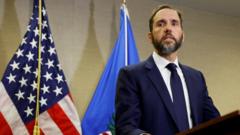In a remarkable turn of events, U.S. Department of Justice officials have reportedly initiated discussions with special counsel Jack Smith regarding the potential termination of criminal cases against Donald Trump prior to the upcoming presidential inauguration. Smith is currently overseeing two high-profile cases against Trump stemming from alleged misconduct related to classified documents and actions surrounding the 2020 election. Reporting from CBS News indicates that these discussions are primarily concerned with legal guidelines that restrict prosecuting sitting presidents and the necessity for a tranquil power transition between the outgoing Biden administration and the incoming Trump administration.
Donald Trump, who is poised to return to office in January after a stunning victory in the recent election, previously expressed intentions to dismiss Smith if elected. The pending legal matters include accusations against Trump for trying to overturn the 2020 election results—allegations linked to the January 6 Capitol riot—and for retaining highly sensitive documents at his Mar-a-Lago estate. Currently, the classified documents case is stalled as it awaits a resolve from the appeals court following a judge's dismissal of Smith's appointment legitimacy. Meanwhile, the election interference case has also been paused, with the Supreme Court having recognized a degree of immunity for presidents regarding activities performed in official capacity.
The contours of the ongoing negotiations suggest that a decision to not pursue federal charges may mitigate potential conflict between Trump and the Justice Department at a politically sensitive time. Smith’s inquiries into Trump's actions during a tumultuous period in American politics continue to captivate public attention, raising questions about legal accountability versus political reality in the current landscape. As both sides strategize on how to navigate these complex legal waters, the outcome of this dialogue could have significant implications for the future of presidential accountability in the United States.
Donald Trump, who is poised to return to office in January after a stunning victory in the recent election, previously expressed intentions to dismiss Smith if elected. The pending legal matters include accusations against Trump for trying to overturn the 2020 election results—allegations linked to the January 6 Capitol riot—and for retaining highly sensitive documents at his Mar-a-Lago estate. Currently, the classified documents case is stalled as it awaits a resolve from the appeals court following a judge's dismissal of Smith's appointment legitimacy. Meanwhile, the election interference case has also been paused, with the Supreme Court having recognized a degree of immunity for presidents regarding activities performed in official capacity.
The contours of the ongoing negotiations suggest that a decision to not pursue federal charges may mitigate potential conflict between Trump and the Justice Department at a politically sensitive time. Smith’s inquiries into Trump's actions during a tumultuous period in American politics continue to captivate public attention, raising questions about legal accountability versus political reality in the current landscape. As both sides strategize on how to navigate these complex legal waters, the outcome of this dialogue could have significant implications for the future of presidential accountability in the United States.




















